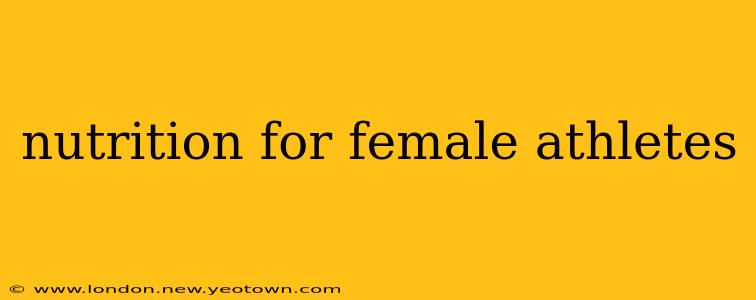The roar of the crowd, the thrill of competition, the sheer joy of pushing physical limits – these are the hallmarks of a female athlete's life. But behind every powerful performance lies a foundation of meticulous training and, crucially, optimal nutrition. This isn't just about eating enough; it's about fueling your body with the right nutrients at the right time to maximize performance, prevent injury, and support overall health and well-being. This isn't a one-size-fits-all approach; every athlete's needs are unique, dictated by their sport, training intensity, and individual physiological factors. Let's delve into the key aspects of nutrition tailored for female athletes.
What are the unique nutritional needs of female athletes?
Female athletes face unique physiological challenges compared to their male counterparts. Hormonal fluctuations, menstrual cycles, and potential iron deficiencies can significantly impact energy levels, performance, and overall health. Understanding these factors is paramount in crafting a personalized nutrition plan. We'll explore these specifics in more detail later.
What are the best foods for female athletes?
Forget restrictive diets; this is about nourishing your body with a vibrant array of nutrient-rich foods. Think of your plate as a colorful tapestry woven with fruits, vegetables, lean proteins, and complex carbohydrates. These provide the essential building blocks for muscle repair, energy production, and hormone regulation. Prioritize whole, unprocessed foods whenever possible, minimizing sugary drinks and processed snacks.
Key Food Groups:
- Lean Protein: Essential for muscle growth and repair. Think chicken breast, fish, beans, lentils, tofu, and Greek yogurt.
- Complex Carbohydrates: Provide sustained energy for training and recovery. Focus on whole grains like brown rice, quinoa, oats, and sweet potatoes.
- Healthy Fats: Crucial for hormone production and overall health. Include avocados, nuts, seeds, and olive oil.
- Fruits and Vegetables: Packed with vitamins, minerals, and antioxidants to support immune function and overall well-being. Aim for a rainbow of colors on your plate!
How many calories should a female athlete eat?
This is a frequently asked question with no single answer. Caloric needs vary wildly based on factors such as:
- Sport: Endurance athletes will require significantly more calories than strength-based athletes.
- Training Volume and Intensity: The harder you train, the more calories you'll burn.
- Body Composition: Muscle mass requires more calories to maintain than fat mass.
- Individual Metabolism: Metabolic rates differ from person to person.
Determining your individual caloric needs often requires working with a registered dietitian or sports nutritionist who can assess your specific needs through careful monitoring and analysis.
How much protein should a female athlete eat?
Protein is the cornerstone of muscle building and repair. While general recommendations exist, the optimal protein intake for female athletes depends on factors like training intensity, muscle mass goals, and individual characteristics. Consulting with a professional is recommended to determine the right amount for your needs. Keep in mind that spreading protein intake throughout the day is more beneficial than consuming large amounts in a single sitting.
What are the best supplements for female athletes?
While a well-balanced diet should provide most essential nutrients, certain supplements may be beneficial for female athletes, particularly in addressing specific deficiencies or meeting increased demands of intense training. These may include:
- Iron: Iron deficiency is common in female athletes, potentially impacting endurance and performance.
- Calcium: Crucial for bone health, especially important for athletes at risk of stress fractures.
- Creatine: Can enhance strength and power output.
- Protein Powder: A convenient way to supplement protein intake if dietary sources aren't sufficient.
Crucially: Always consult with a healthcare professional or registered dietitian before starting any supplement regimen. Supplements are not a substitute for a healthy diet.
What are the risks of inadequate nutrition for female athletes?
Inadequate nutrition can significantly jeopardize athletic performance and overall health. Potential consequences include:
- Reduced Performance: Lack of energy, decreased muscle strength, impaired recovery.
- Increased Risk of Injury: Weakened bones, compromised muscle function.
- Menstrual Irregularities: Amenorrhea (absence of menstruation) can lead to bone loss and other health issues.
- Impaired Immune Function: Increased susceptibility to illness and infection.
- Nutrient Deficiencies: Can have a wide range of negative impacts on health and athletic performance.
How can I create a personalized nutrition plan for myself?
Creating a personalized nutrition plan that addresses your unique needs as a female athlete requires a holistic approach. Consider these steps:
- Consult a professional: A registered dietitian or sports nutritionist can assess your individual needs, goals, and training regimen to develop a tailored plan.
- Track your food intake: Use a food diary or app to monitor your calorie and macronutrient intake.
- Pay attention to your body: Listen to your hunger and fullness cues.
- Prioritize whole foods: Focus on nutrient-dense, unprocessed foods.
- Stay hydrated: Drink plenty of water throughout the day.
- Consider your menstrual cycle: Adjust your calorie and nutrient intake as needed based on your hormonal fluctuations.
By prioritizing optimal nutrition, female athletes can unlock their full athletic potential, enhance their well-being, and enjoy a vibrant and successful sporting journey. Remember, fueling your body effectively is just as crucial as the training itself. It’s an investment in your performance, your health, and your long-term success.

